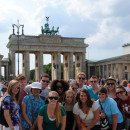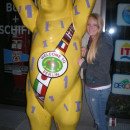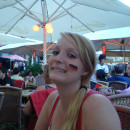Study in Berlin Helped Me Gain Cultural Awareness Past Review
By Tessa M (International/Global Studies., Texas A&M University - College Station) for
IES Abroad: Berlin - Study Abroad With IES Abroad
The most imoprtant thing I learned during my time abroad was how to become culturally aware and how important globalization really is for the future success of mankind. I learned how to live almost on my own and become more independent than I was prior to this experience. I made very close friends that were in the study abroad program with me, who I have continued to keep in touch with. I also met so many other interesting people, and still even keep in touch with some of the program staff. While I did not become close with my host family, I realized through them how much effort it takes to automatically adjust to someone else's rules and respect their culture. I plan to do another study abroad for a semster next fall. This time I'll be even more prepared for what to expect because I plan to do it in Germany again. Learing about European politics has led me to pursue a career in foreign politics, and also because I realize the importance of globalization. I am also continuing to learn the German language and plan to perfect my speaking skills. This experience has led to so much more in my life at home, and for that I am so glad that I made a decision to study abroad.
Review Photos



Personal Information
| How much international exposure did you have prior to this program? | 2 weeks - 1 month |
Review Your Program
|
* Overall educational experience
Academic rigor, intensity, resources, etc. |
I was amazed at the differences in the education system between Germany and the United States. Generally speaking, the work is more intense in a German University. I took an intermediate level class of German language, and realized very quickly that expectations from the teacher were much higher than at my home university. The teacher spoke to the class very fast, which in the end was very helpful for getting us accustomed to the reality of speaking the language. I am very grateful for having a chance for this wonderful experience. My German has improved dramtically since being in Berlin. |
|
* Host Country Program Administration
On-site administration of your program |
The program gave a wide variety of information during my first day of the program. They gave us several options for contacting people if there was an emergency, helped us learn to use the transportation system on the first day, and there was always information from the staff about what was going on in the city. They also gave us several survival tips and learning how to assimilate into the culture. We went on a field trip to Krakow, Poland, which I thought was very well planned by the staff. The only complaint that I have is that some students did not get a very well matched with their host families, including myself. The program only consisted of 14 students which was easier to get to know everyone. |
|
* Housing:
How satisfied were you with your living arrangements? |
The neighborhood that I was situated in did not feel completely safe at night, but at the same time it was a very large culture center that had many interesting things going on all the time. It wasn't too long of a commute to get to my study abroad center. It took around 30 minutes, which is a normal commute time in Berlin. My host family was not really what I expected them to be. They didn't show an interest in me or offer me anything to eat except for the first day I arrived. But the flat that they lived in was very nice and I had my own bedroom which was also nice. I did not enjoy having to share one bathroom with the entire family. |
| * Food: |
The food was one of the best aspects of studying abroad. You could get it for a very good price at most places. My personal favorite food was very inexpensive. It is called a döner kebap, which is Turkish food. You can find the shops that sell them almost anywhere in the city. Among other great cuisine that I enjoyed was Thai food. Berlin has some of the best Thai food restaurants, and you can also get most of it for cheap. I also tried a few Indian restaurants, which were good but somewhat expensive. Overall, if you're looking for cheap food though, Berlin is a great place to go. |
|
* Social & Cultural Integration:
How integrated did you feel with the local culture? |
The field trip to Krakow, Poland was the most memorable field trip. We visited all the tourist attractions such as castles and city centers. The best part of being in Poland was that it is very cheap for Americans. One American dollar is equal to about 3.37 Polish Zloty. Of course we did other things like going to clubs and watching the World Cup while there. In Berlin, I was fortunate to have my boyfriend with me, who is German and lives with his family there. They were my real family away from home. |
|
* Health Care:
How well were health issues addressed during the program? |
|
| * Safety: |
People do not own guns in Europe as they do in the United States. Still, you have to be careful being in a foreign country. Pickpocketing is common in big cities so that is the main thing students should look out for. Standing out as a tourist is one way get into trouble as far that goes. The program did a good job on informing us of safety issues on the first day of the program. Health insurance was provided by the program and that was not a worry. If someone needed to see a doctor, the program staff helped us get in to be treated almost immediately. |
| If you could do it all over again would you choose the same program? |
Yes
|
Finances
|
* Money: How easily were you able to live on a student's budget?
(1 = not very easy/$200+ on food & personal expenses/week, 2.5 = $100/week, 5 = very easily/minimal cost) |
|
Language
| * Did your program have a foreign language component? | Yes |
| Language acquisition improvement? |
I practiced language with everyone I came into contact with. It started from the simplest things such as speaking to the server at a restaurant in German to speaking with my host family, who did not speak english. There was a slight problem in the beginning with communinicating, but you have to immerse yourself in order to really learn a language. When problems did arise, most people in Germany spoke english well enough to be able to communicate. |
| If applicable, to what degree did your living situation aid your language acquisition? |
|
Other Program Information
|
* Where did you live?
Select all that apply |
|
|
* Who did you live with?
Select all that apply |
|
A Look Back
| * What do you know now that you wish you knew before going on this program? | If you are open minded and do not get homesick easily, study abroad is well worth your time. You have to be able to adjust to a different cultural rapidly and respect different values of your own. |
Individual Course Reviews
| Course Name/Rating: |
Germany and European Unification |
| Course Department: | PO358 |
| Instructor: | Bernhard Maleck |
| Instruction Language: | english |
| Comments: | This course taught me so much about the structure and function of the European Union. I know now more than what 99% of Americans do about the European Union. Field trips and a real, in-class simulation of the European Parliament helped reinforce this. The professor was very knowledgeable on topics of instruction, having been a former member of the East German Parliament himself. |
| Credit Transfer Issues: | None, but students should make sure that the credits will transfer prior to leaving their home university. |








